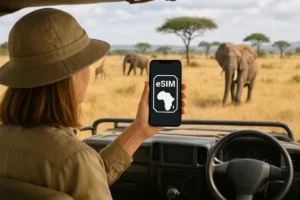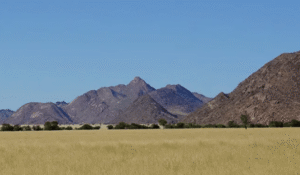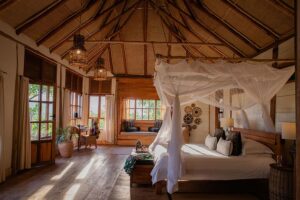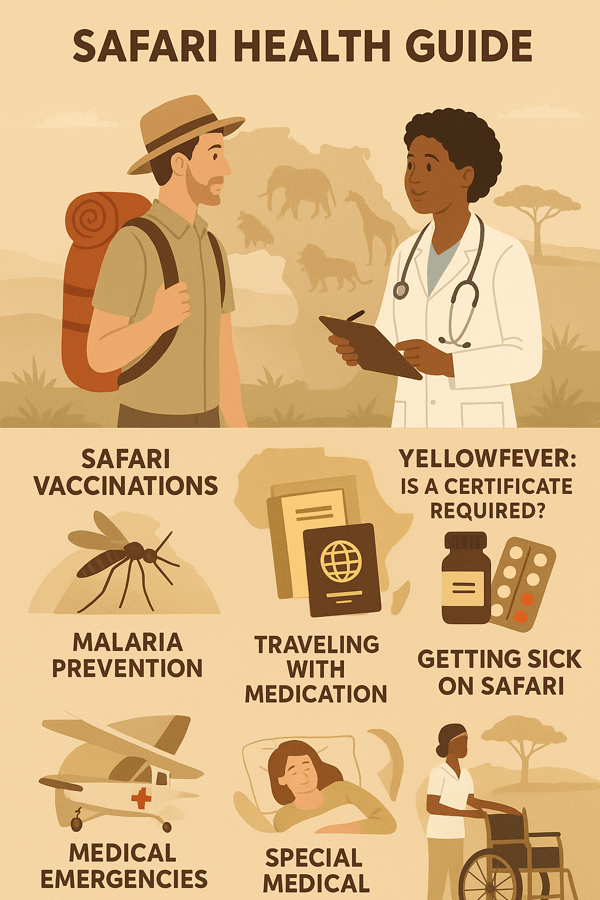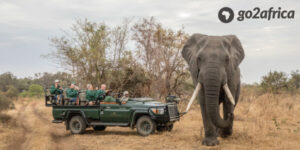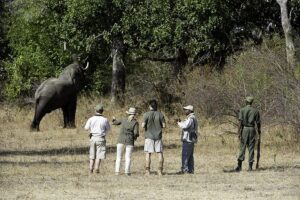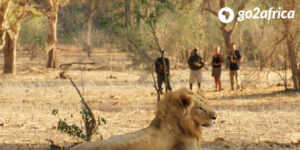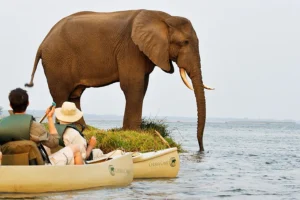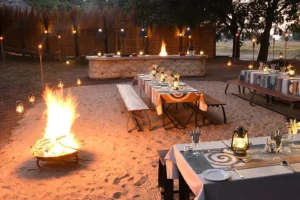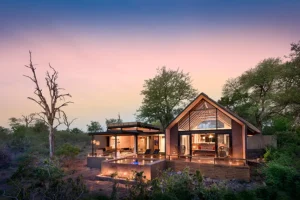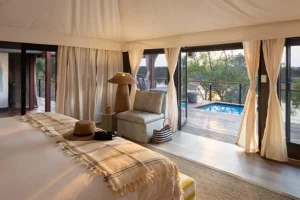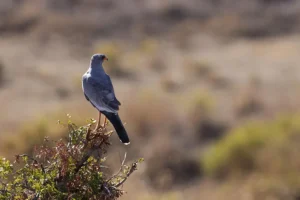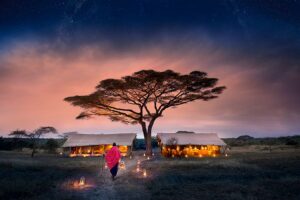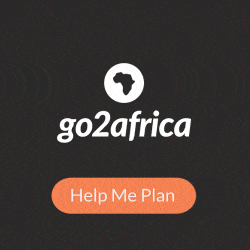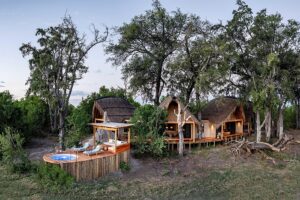Safari Frequently Asked Questions
Safari Destinations: Where to Go in Africa
Safari Basics: What is a luxury African safari?
A luxury African safari offers exclusive wildlife experiences with private game drives, expert guides, premium lodges or tented camps, fine dining, and personalized itineraries in destinations such as Botswana, Kenya, Tanzania, South Africa, Zambia, and Zimbabwe.
Safari frequently asked questions help travelers understand what to expect on luxury African safaris, from game drives and wildlife sightings to packing essentials, safety, and costs across East and Southern Africa.
Safari Hotspots: What are the Most Popular safari Destinations?
Kruger National Park (South Africa): Known for its high concentration of wildlife, including the Big Five, and diverse landscapes.
Sabi Sands Private Game Reserve (South Africa): Offers excellent Big Five sightings and luxury lodge experiences.
Madikwe Game Reserve (South Africa): A large, malaria-free reserve with diverse wildlife and fewer crowds.
Masai Mara National Reserve (Kenya): Famous for the Great Migration and abundant wildlife, including the Big Five.
Serengeti National Park (Tanzania): Another key location for the Great Migration and diverse wildlife viewing.
Ngorongoro Crater (Tanzania): A unique volcanic crater with a high concentration of wildlife.
South Luangwa (Zambia) : The birth place of walking safaris.
Okavango Delta (Botswana) the biggest inland Delta considered as one of Nature’s masterpieces.
Victoria falls (Zimbabwe) is one of Africa’s most-visited attractions with seasonal white-water rafting, thrilling gorge swings, bungee jumps on the Zambezi River.
African Wildlife: What Is the Big 5?
Safari & Beach: Can You Combine Both?
How much do luxury safari packages cost?
Luxury safari packages typically range from $800 to $2,500+ per person per night, depending on the destination, season, lodge type, and whether flights or private transfers are included.
Safari Regions: East Africa vs. Southern Africa which on has the Best Safari?
East Africa (Kenya, Tanzania) is famous for the Great Migration and vast open plains. Southern Africa (Botswana, South Africa, Namibia, Zimbabwe, Zambia) offers varied landscapes, luxury lodges, and exceptional year-round game viewing.
Solo Safaris: Are They Suitable for Solo Travelers?
Yes—many lodges welcome solo travelers and offer shared game drives, communal dining, and friendly social atmospheres. Some even waive single supplements during certain seasons.
Safari Groups: How Many People Will Be in My Vehicle?
Group sizes vary by lodge and activity. Luxury safaris typically limit game drive vehicles to 6–8 guests to ensure comfort and great viewing opportunities. Private safaris can be arranged for couples, families, or small groups.
Safari Travel: Visa & Insurance Essentials
Visa Requirements: Do I Need One for My Safari?
Visa requirements vary depending on your nationality and the country you’re visiting. Some African countries allow visa-free entry or visas on arrival, while others require you to apply in advance.
Visa Assistance: Can You Help Me Arrange It?
We do not arrange visas at Go2Africa, but we understand that visa arrangements can be complex and time-consuming. That’s why we recommend a convenient visa assistance service to help make the process as smooth as possible for our travellers.
We have partnered with Sherpa, a trusted visa and passport service provider, to assist you with your visa requirements. Sherpa’s team of experts can provide personalised guidance and support, ensuring that you have the necessary documents and meet the specific visa requirements for your chosen destinations.
They will assist you in completing the application forms, gathering the required documents, and submitting them on your behalf to the relevant embassies or consulates
What Documentation Do We Need to Bring with Us?
When embarking on your African safari adventure, it’s important to ensure you have the necessary documentation with you. Here’s a list of essential documentation to bring:
- Passport: Your passport is your most important travel document. Ensure that it is valid for at least six months beyond your intended departure date from Africa. Check the specific entry requirements for the countries you plan to visit as some may require a visa. Remember to make copies of your passport and keep them separate from the original for backup purposes.
- Visas: Depending on your nationality and the countries you plan to visit; you may need to obtain visas in advance. Research the visa requirements for each destination and allow sufficient time for the application process. Some visas can be obtained upon arrival, while others require advance application.
- Travel Insurance: It’s highly recommended to have travel insurance that covers medical expenses, trip cancellation, lost luggage, and other unforeseen circumstances. Ensure that your insurance policy provides adequate coverage for your entire trip duration and the activities you plan to undertake, such as wildlife viewing and adventure sports.
- Health Documents: Check if any vaccinations or specific health requirements are needed for the countries you plan to visit. Some destinations may require a Yellow Fever vaccination certificate or other immunisations. Consult with your healthcare provider or a travel clinic for the most up-to-date information and recommendations.
- Itinerary and Confirmation Documents: Keep copies of your itinerary, flight tickets, hotel reservations, and any tour or activity confirmations. It’s helpful to have both digital and printed copies accessible during your travels.
Remember to keep all your important documents in a secure place, such as a travel document organizer or a locked bag. It’s also a good idea to share your itinerary and contact details with a trusted family member or friend back home. If you have any specific questions regarding documentation requirements for your chosen destinations, our knowledgeable Africa Safari Experts are here to assist you and provide guidance.
Traveling With Children: Required Documentation in Africa
When travelling with children in Africa, it’s important to have the necessary documentation to ensure a smooth and enjoyable journey. At Go2Africa, we understand that family travel requires careful preparation, so here’s a breakdown of the documentation you’ll need:
- Passports: Each child must have their own passport, regardless of age. Make sure that their passports are valid for at least six months beyond your intended departure date from Africa. It’s also a good idea to make copies of the passports and keep them separate from the originals for backup purposes.
- Birth Certificates: Some African countries require proof of parentage when travelling with children. Carry unabridged birth certificates for all children, which contain the names of both parents. Some countries may also require additional documentation, such as consent letters from non-travelling parents or legal guardians.
- Visas: Check the visa requirements for each country you plan to visit with your children. Some countries may require children to have their own visas, while others include them on their parent’s or guardian’s visa. It’s crucial to research and understand the visa regulations to ensure compliance.
- Consent Letters: If you are travelling with a child and both parents are not accompanying them, it’s advisable to carry a consent letter from the absent parent(s) or legal guardian. This letter should include information about the child, the travelling parent(s) or guardian, and consent for the child to travel internationally.
At Go2Africa, we will advise you of the latest requirements and regulations for travelling with children in Africa, as they can vary by country. We are here to provide personalised assistance and help you navigate the documentation process.
Transit Visas: Do I Need One if Just Passing Through?
Visa requirements for transit passengers vary depending on the country you are transiting through and the duration of your layover. Many countries have specific transit visa exemptions or visa-on-arrival options for passengers who are transiting through their airports for a brief period, usually less than 24 to 48 hours (about 2 days). However, it’s crucial to check the specific transit visa regulations of the country you will be transiting through to determine if a visa is required for your situation.
Whether you need a transit visa or not, it’s always recommended to check the latest visa requirements and regulations for your transit country well in advance of your travel dates.
Passport Validity: How Long Should It Be Valid?
Most African countries require your passport to be valid for at least 6 months after your planned return date, with at least two blank pages available for entry stamps.
Travel Insurance: What Type Should I Get?
A comprehensive travel insurance is strongly recommended for all safaris.
Choose a policy that includes:
Emergency medical evacuation from remote areas
Hospitalization costs
Trip interruption or cancellation
Baggage loss or loss of personal belongings.
Name Changes: Traveling After Marriage With a Different Surname
The name on your ticket must always match the name on your passport so if you want to travel under your married surname, then you will have to have a passport which matches your married surname.
Airlines no longer accept a marriage certificate as proof of the name change. If you are unable to obtain a new passport before you travel, you will have to travel under your maiden surname.
Safari Health: Medical Advice & Vaccination Requirements
Safari Vaccinations: Which Vaccinations are required?
Yes, some vaccinations are recommended or required depending on your safari destination. Commonly advised vaccines include Hepatitis A, Typhoid, and Tetanus.
Your doctor or travel clinic can advise based on your itinerary. For personalized advice, contact our expert safari planners today.
Yellow Fever: Is a Certificate Required?
Many African countries require proof of Yellow Fever vaccination if you are traveling from or transiting through a Yellow Fever risk country.
For personalized advice, contact our expert safari planners today.
Malaria Prevention: Do I Need Medication?
If you are visiting a malaria-prone area, your doctor will likely prescribe preventive medication. In addition, wearing long sleeves in the evenings, sleeping under mosquito nets, and using repellent will reduce your risk.
Traveling With Medication: Rules & Tips
Yes, but carry medication in its original packaging along with your doctor’s prescription. This is important for customs checks and in case you need refills during your trip.
Doctor’s Letters: When You Need One for Travel
- In most cases, it is advisable to carry a doctor’s letter when travelling with medication. While the requirements may vary depending on your destination and the type of medication, having a doctor’s letter can help avoid any potential issues or misunderstandings at customs or security checkpoints.
- A doctor’s letter serves as documentation to validate your need for the medication and can be particularly important if you are carrying controlled substances or injectable medications. It should include vital details such as your name, the name and dosage of the medication, the purpose for which it is being used, and the prescribing doctor’s contact information.
- It’s important to check the specific regulations and requirements of your destination before you travel, as some countries may have specific guidelines or restrictions on certain medications. Consulting with a healthcare professional or a travel medicine specialist is also recommended to receive personalised advice based on your specific medical needs and travel plans
Getting Sick on Safari: What Happens Next
Lorem ipsum dolor sit amet, consectetur adipiscing elit. Ut elit tellus, luctus nec ullamcorper mattis, pulvinar dapibus leo.
Medical Emergencies: Is there Air Evacution in the Bush?
For more severe medical situations, there are evacuation procedures in place to ensure prompt medical care. Many safari destinations have air evacuation services that can transport you to a well-equipped hospital or medical facility. These services are coordinated by experienced professionals who work closely with safari operators and lodges to ensure a swift and efficient response.
At Go2Africa, our dedicated team is available 24/7 to provide support and assistance in case of any emergencies during your safari. We work closely with our partners on the ground to ensure seamless coordination in case medical attention is required.
Special Medical Needs: Can You Still Go on Safari?
- Yes! At Go2Africa, we believe everyone deserves the chance to enjoy the wonder of a safari, no matter their medical needs. We recognise that every traveller is different and aim to provide the right support to ensure your safari is both safe and memorable.
- When booking your safari, it’s essential to share any medical requirements with your African Safari Expert. They will work with you to understand your needs and arrange suitable options. Whether it’s dietary restrictions, mobility assistance, or special equipment and accommodations, we’ll make every effort to customise your safari accordingly.
- Many safari lodges and camps can cater to specific medical needs, and some even offer specialised facilities or trained staff. Still, informing us ahead of time is key so we can choose the best accommodation for your situation.
Safari Dining: Managing Dietary Restrictions & Allergies
Most luxury lodges cater to dietary needs, including vegetarian, vegan, gluten-free, and allergy-sensitive meals. Always inform your consultant at the time of booking so the lodge can prepare in advance.
Safari Wildlife & Activities
Game Drives: What Wildlife Can You See on a Classic Safari Drive?
Game drives are trips in open 4×4 vehicles to look for animals. They usually happen early morning and late afternoon when animals are most active. For example, you might see elephants drinking at a waterhole at sunrise.
Look at the picture at the top right
Walking Safaris: Are There any Walking Safaris?
Yes, in many areas you can join a guided walking safari. This lets you explore the bush on foot with a trained ranger. You’ll focus on smaller details — animal tracks, plants, insects, and bird calls — that you might miss from a vehicle.
For example, Zambia’s South Luangwa National Park is famous for walking safaris, where you might come across giraffes or zebras from a safe distance.
Night Drives: What Can You See on a Night Drive Safari?
There are night drives usually only in private reserves or certain national parks. Night drives let you see nocturnal animals like hyenas, porcupines, bush babies, and sometimes leopards hunting.
For example, in Sabi Sands Private Game Reserve South Africa, night drives are common and give you the chance to watch predators in action under a spotlight.
Game Drive Duration: How long does a game drive last?
Game drives usually last about 3 to 4 hours.
Morning drives often start around 5:30–6:00 am and finish by 9:00–10:00 am, when the sun gets hotter and animals rest in the shade.
Afternoon drives usually begin around 3:30–4:00 pm and end just after sunset (about 6:30–7:00 pm), sometimes followed by a short night drive to spot nocturnal animals.
- In some private reserves, you can even do full-day game drives with picnic lunches in the bush — for example, in the Serengeti during the Great Migration, guides might stay out all day to follow the herds.
Your guide will plan the timing so you have the best chance to see active animals and beautiful light for photos.
Sundowner Hour: The Magic of an African Sunset Sundowner Hour-BOMA FIRE
As the golden African sun dips low on the horizon, the bush transforms into a world of warm colors and soft shadows. This is sundowner hour — a cherished safari tradition. Picture yourself gathered around a glowing boma fire, a gentle breeze carrying the scent of the wild. In your hand, a chilled drink; in your ears, the distant roar of a lion or the call of a nightjar.
Conversations grow quieter as everyone watches the fiery sky fade into deep purples and star-studded black. It’s a moment of pure peace, where nature and soul meet. Whether you’re in the Serengeti, Kruger, Mana pools, Sabi Sands, Timbavati or the Okavango Delta, sundowner hour is the heart-stealing pause between day and night on safari.
Walking Safaris: How Close Can You Get to Nature on Foot?
Walking safaris offer one of the most authentic and thrilling ways to experience Africa’s wilderness. Unlike game drives, where you observe wildlife from the safety of a vehicle, on foot you become part of the environment, listening to bird calls, tracking animal footprints, and smelling the earthy scents of the bush. While sightings of elephants, giraffes, or zebras from a safe distance are unforgettable, the real magic lies in noticing the small details: dung beetles at work, medicinal plants, and animal tracks that tell stories of the night before.
Expert guides and armed rangers ensure safety while sharing fascinating bushcraft knowledge. Top destinations for walking safaris include South Luangwa National Park in Zambia, often called the birthplace of walking safaris, and Mana Pools in Zimbabwe, where encounters are truly wild and intimate.
Birdwatching: Where Can You Experience Africa’s Most Spectacular Birdwatching?
Birdwatching: Africa’s Spectacular Birdlife
Africa has over 2,000 bird species, making it a paradise for bird lovers. Many safari destinations have over 450 species in a single area. In Botswana’s Okavango Delta, you might spot colorful carmine bee-eaters, giant kingfishers, and the powerful African fish eagle.
If you visit wetlands like Lake Naivasha in Kenya, you’ll see huge flocks of flamingos, while the savannas of Tanzania’s Serengeti are home to secretary birds and ostriches. In addition, South Luangwa in Zambia is one the best bird watching safari Whether you’re a beginner or an expert, birdwatching in Africa is unforgettable.
Cultural Visits: Meet Local Communities
Some safaris include visits to villages where you can meet local people, learn about traditions, see crafts being made, and participate in improving their lives through community projects.
Hot Air Balloon Safaris: What Can You Experience on a Hot Air Balloon Safari in Africa?
A Bird’s-Eye View
Float over the plains at sunrise in a hot air balloon. In the Serengeti, you can watch herds of wildebeest from above.
Hot air balloon rides are available near Kruger National Park, specifically over the Lowveld game areas adjoining the park.
Golden Hour: Why Is Golden Hour the Most Magical Time on Safari?
There’s nothing quite like the tradition of sundowners on safari. As the sun begins to dip below the horizon, the African sky transforms into a canvas of fiery oranges, soft pinks, and deep purples. This enchanting Golden Hour is the perfect time to pause after an exciting day of wildlife viewing and soak in the beauty of the bush.
Guests gather in scenic spots overlooking rivers, open plains, or waterholes, enjoying a refreshing drink, perhaps a classic gin and tonic or a chilled glass of wine while the sounds of the wild echo around them. From the Serengeti in Tanzania to the Okavango Delta in Botswana, sundowners create unforgettable moments of romance, reflection, and pure connection with nature.
Safari Accommodations: Tents, Camps & Lodges
Tented Safaris: What Are the Classic and Luxury Options for Tented Safaris?
Tented safaris are large, comfortable tents set up on wooden decks with real beds and bathrooms. Some have air-conditioning and private verandas. For example, in the Okavango Delta in Botswana, luxury tents have views over hippo-filled lagoons.
Which is the Right Accommodation for my Safari
If you want comfort and facilities, choose a lodge. If you want a real bush feel, try a tented camp. Many travelers mix both in one trip.
Safari Camps: Real Bush Experiences
Safari camps are often in the middle of wildlife areas. They may have a mix of tents and huts. You’ll hear animals at night — lions roaring or hyenas laughing — which makes it exciting.
Safari Lodges: Comfort & Style in the Wilderness
Lodges are like small hotels in the bush. They have stone or wooden rooms, electricity, a pool, and sometimes a spa. For example, lodges in Kruger National Park offer luxury suites with plunge pools.
Top 5 South African Safari Lodges: What Are the Top 5 South African Safari Lodges and What Makes Them Unique?
| Rank | Lodge Name | Activities | Ideal Travelers | Highlights & Additional Info |
|---|---|---|---|---|
| 1 | Waterbuck Private Camp | Game drives, Guided walking safaris, Picnics, Private vehicle with driver, Spa treatments | Couples, Safari Enthusiasts | Located in Timbavati Private Game Reserve, part of the Greater Kruger ecosystem. Known for its intimate size with only a few chalets, allowing a personalized safari experience. Offers multiple vehicles for private or shared game drives. Approx. 4–5 hours from Johannesburg Airport. Big Five viewing is excellent. |
| 2 | Sanbona Tilney Manor | Bird watching, Bush dining, Game drives, Picnics, Spa treatments | Families, Luxury Travelers | Situated in the Sanbona Private Reserve (Western Cape). Larger than Waterbuck, with spacious suites and multiple safari vehicles. Known for luxury, privacy, and unique landscapes with mountain and desert scenery. Approx. 3 hours from Cape Town Airport. Offers Big Five sightings in a different terrain compared to Timbavati. |
| 3 | Sindile Safari Lodge | Bird watching, Bush walks, Dinner under the stars, Game drives, Night drives | Couples, Adventure Seekers | Eastern Cape lodge combining traditional safari with immersive night drives and stargazing opportunities. Easy access to Port Elizabeth Airport (~2.5 hrs). Focused on wildlife diversity and bush experiences. |
| 4 | Simbavati Mvubu Cottage | 4×4 Drives, Bird watching, Bush walks, Dinner under the stars, Game drives | Small Groups, Couples | Private lodge in Timbavati with tailored safari drives, offering more seclusion. Perfect for intimate wildlife encounters. Proximity: 4–5 hours from Johannesburg Airport. |
| 5 | Sala Beach House | Beach within walking distance, Golf, Nature walks, Snorkelling, Spa treatments | Couples, Relaxation Seekers | Coastal lodge on the KwaZulu-Natal coast. Combines beach and nature activities with optional nearby wildlife experiences. Approx. 1.5 hours from Durban Airport. Great for travelers who want both safari and coastal relaxation. |
Safari Safety & Emergencies
Safety Briefings: What to Know Before You Go
Before your first game drive, your guide will explain safety rules like “stay in the vehicle” and “keep noise low.” Mute phones.
Wildlife Safety: How to Stay Safe Around Animals
Never get too close to wild animals, even in camps. Keep tents zipped and don’t feed wildlife.
Health Precautions: Staying Well on Safari
Drink bottled water or purified bottled water, use insect repellent, and wear sunscreen.
Emergency Procedures: What Happens if Something Goes Wrong
If your vehicle breaks down, the guide will call for help using a radio. If someone is injured, lodges can arrange fast medical evacuation.
Security Tips: Keeping Your Belongings Safe
Use lodge safes for passports, money, and electronics. Camps are generally safe, but it’s good to be careful.
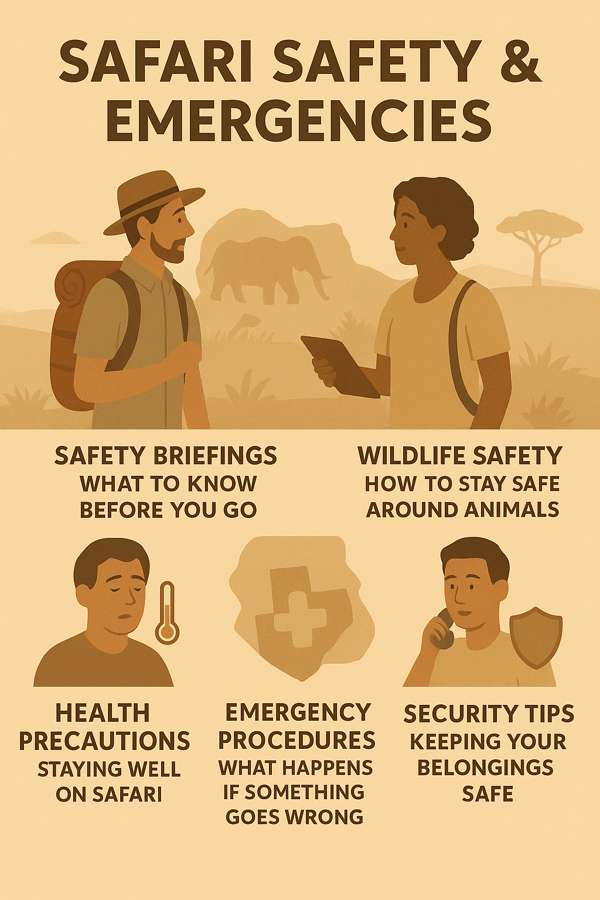
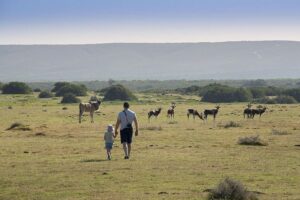
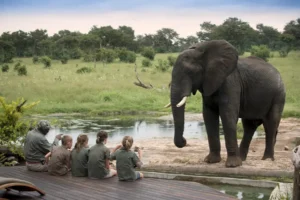
Safari Families: Tips for Traveling With Kids
Family-Friendly Safari Destinations
Places like South Africa’s Madikwe Game Reserve and Kenya’s Ol Pejeta Conservancy welcome children and have malaria-free areas.
Best Ages for Kids on Safari
Many lodges accept children aged 6 and up for game drives. Younger kids can still enjoy short walks, animal tracking, or cultural visits.
Activities for Children on Safari
Some lodges have junior ranger programs where kids learn about animal tracks and bush skills.
Safety Tips for Kids in the Bush
Always keep children near you. Listen to guides and follow camp rules.
Family Accommodation Options
Look for lodges with family suites or interconnecting rooms. Some camps have private guides just for families.
eSIM for Luxury Safari Travelers
What Is an eSIM and How Does it Work?
An eSIM (embedded SIM) is a digital SIM card built into your smartphone or device. Instead of inserting a physical SIM, you download a profile from a provider and activate it instantly. It works the same way as a regular SIM but without the need for a plastic card.
Do eSIMs Work in Remote Safari Camps?
Yes, but speeds may drop outside towns. Most luxury lodges have Wi-Fi too.
How to Avoid Expensive Roaming Fees and Enjoy Seamless Internet While Exploring Africa’s Wldest Luxury Destinations.
- Use eSIM
No need to swap SIM cards.
Works instantly after purchase.
Save up to 90% on roaming.
Great coverage in safari hotspots (South Africa, Kenya, Tanzania, Botswana, Zambia, Namibia,Uganda, Rwanda, Zimbabwe).
Best 3 eSIM Providers for Safari Travelers
| Provider | Coverage | Highlight | Benefits |
|---|---|---|---|
| Airalo | 200+ countries | Reliable & affordable | Most trusted by safari travelers |
| Holafly | 190+ countries | Unlimited data plans | Great for heavy Instagram/TikTok users |
| Eskimo eSIM | Africa + global | 2-year data validity | Perfect for long-term travel |
Is My Phone Compatible With eSIM?
Not all phones support eSIM. Most modern smartphones like the iPhone XS and newer, Google Pixel 4 and newer, and many Samsung Galaxy models do. Travelers must always check their phone’s eSIM compatibility before buying.
Can I Use WhatsApp/Maps/Instagram?
Yes, all Apps work normally.
Can I Use eSIM And My Physical SIM at The Same Time?
Yes, most eSIM-compatible phones support dual SIM: one physical SIM + one eSIM (or even multiple eSIMs, though usually only one can be active at a time). This is useful for keeping your home number active while using local or travel data.
What Happens If I Run Out Of Data On My eSIM?
You can usually top up or buy another data plan directly from the eSIM app or website. Providers like Airalo and Holafly allow quick top-ups without needing to delete and reinstall the eSIM.
Can I Keep My WhatsApp Number With An eSIM?
Yes, switching to an eSIM for data does not affect your WhatsApp number. As long as your physical SIM (with your main number) stays in the phone or your number remains active, WhatsApp continues working as usual.
